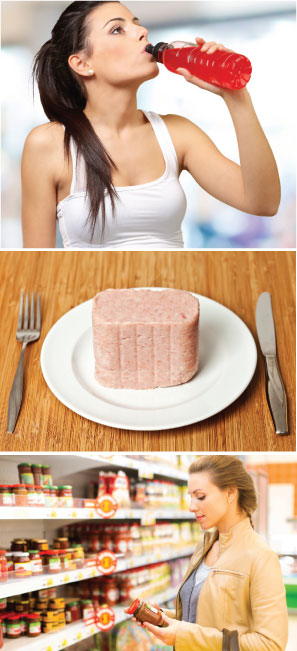In this era of health ‘musts’, we are bombarded with guidelines on what we must do to achieve optimum wellness. On a different note, Behnaz Sanjana looks into what we must steer clear of to end this year and start the new one on the right note.
Trailing the aisles of the supermarkets after a tiring day makes it easy to fall prey to edible demons. However, not if you know better. Danah Quintana, clinical dietician at Bahrain Specialist Hospital, explains how what we put in our cart determines our overall wellbeing.
Boisterous Beverages
Aerated drinks: Thirsty? Chances are you’ll be reaching for that shiny can of fizz more often than good old H2O.
“People who consume sugary drinks regularly – one to two cans a day or more – have a 26 per cent greater risk of developing Type 2 diabetes than people who rarely have such drinks,” says Danah. She also tells us that a study which followed 40,000 men for two decades found those who averaged one can of a sugary beverage per day had a 20 per cent higher risk of suffering a fatal heart attack than men who rarely consumed sugary drinks. Women showed a similar sugary beverage-heart disease link.
 What’s more, downing cans of soft drinks increases your risk of gout, a severely painful and sore condition.
What’s more, downing cans of soft drinks increases your risk of gout, a severely painful and sore condition.
Energy drinks: These cleverly marketed ‘pick-me-ups’ promise an instant burst of vigour, but are actually caffeine-loaded killers.
Danah says: “The risks associated with energy drinks among young people have largely gone unaddressed and are poised to become a significant public health problem in the future.”
An overdose of caffeine can lead to a number of symptoms, including palpitations, high blood pressure, nausea and vomiting, convulsions and, in some cases, even death. She cites that indiscriminate consumption of energy drinks can have devastating effects – Type 2 diabetes, miscarriage, low birth weight and stillbirths in pregnant women and neurological and cardiovascular disorders in children and adolescents. Ironically, these ‘sporty’ drinks cause obesity.
Packaged fruit juices: If you want to pat yourself on the back for choosing fruit juice instead of fizzy drinks; hold your horses!
“Fruit juice is not a better option. Even though it has more nutrients, it contains as much sugar and calories as soft drinks. So stick to no more than a small glass (four to six ounces) a day,” says Danah.
She favours enjoying a whole piece of fruit, which is lower in sugar and contains the added benefit of fibre.
Mmmm … Meat!
Processed meat is meat that has been transformed through salting, curing, fermentation, smoking, or other processes to enhance flavour or improve preservation. Think hot dogs, sausages, corned beef, biltong or beef jerky and burger patties as well as canned meat and meat-based sauces.
A World Health Organisation report has identified that some of the substances used in the smoking process to preserve meats may lead to the formation of cancer-causing compounds called polycyclic aromatic hydrocarbons (PAHs). Also, processed meats contain nitrites as preservatives to prevent bacterial growth and as colouring agents, but nitrites may form compounds called N-nitroso compounds – found to cause cancer in animal studies. Think about the chemicals and preservatives you are feeding your body in the name of nuggets!
A heads-up to those who love to get the barbeque out and start grilling – high-temperature methods, such as grilling, frying or broiling, can form more cancer-promoting chemicals, such as heterocyclic amines (HCAs), and the char on the outside of meats can contain PAHs. Danah says: “The American Cancer Society Guidelines on Nutrition and Physical Activity and Cancer Prevention currently advise people to limit how much processed meat and red meat they eat. The American Institute for Cancer Research recommends specific amounts of meat in its dietary guidance. It says that people should avoid eating processed meat, or reserve eating it to only a few special occasions during the year.”
Pre-packed treats
Just step into any supermarket for an abundance of pre-packed goodies lining the shelves to satiate your hunger pangs. But, when you take a bite of that doughnut doused in sugar, you are ingesting transfats. They raise your bad (LDL) cholesterol levels and lower your good (HDL) cholesterol levels. Every bite increases your risk of developing heart disease, stroke and diabetes. The same goes for baked goods including cakes, pie crusts, biscuits, frozen pizza, cookies, crackers, stick margarines and other spreads.
Danah suggests reading the label on the package to decide whether to dig in or ditch it. “Look at the Nutrition Facts panel. You can also spot trans-fats by reading ingredient lists and looking for the ingredients referred to as ‘partially hydrogenated oils’.”
It is important to remember that besides containing transfats, most treats are plain refined flour – a carbohydrate that is extensively processed and transformed. “Refined carbs contain a lot of empty and unsatisfying calories. Because these foods do not give your body the nutrients it needs, they do not promote satiety and actually lead to more carb cravings and overeating, causing obesity,” says Danah. That muffin you wolfed down will soon transform into your muffin-top.
A steady intake of these no-good foods can have an awful effect on your pancreas, raise cholesterol and cause diabetes.
Danah dares you to challenge yourself to eliminate added sugar and white flour from your diet for a month. Although it may be difficult at first, your cravings will slowly decrease, she ensures.
Time to shop smart to eat right.





































